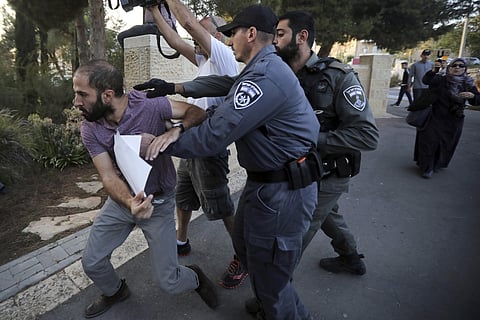

RAMALLAH (West Bank): One of the men was hospitalized with kidney failure and 11 broken ribs. Another was nearly unrecognisable to his wife when he was wheeled into a courtroom. A third was stitched up after being attacked by a security dog.
Then the three Palestinians were returned to their Israeli interrogators. They had been swept up in a sprawling manhunt launched after a roadside bomb killed a 17-year-old Israeli girl and wounded her father and brother as they hiked down a spring last August in the occupied West Bank.
The attack raised fears of a sophisticated militant cell that might strike again, and Israeli interrogators appear to have treated it as a ticking time-bomb scenario. Israeli and Palestinian rights groups say there is strong evidence that they tortured several detainees in violation of Israeli and international law.
The allegations against Israel are the most serious to come to light in years, and the rights groups say they point to a loosening of constraints two decades after the Israeli Supreme Court outlawed most forms of torture.
Lawyers and family members of the three main suspects say they were tortured to the point of being hospitalized. Several other Palestinians swept up by Israel's Shin Bet internal security agency said they were threatened, beaten, forced into painful stress positions and denied sleep.
A landmark 1999 Israeli Supreme Court ruling forbids such torture. But the law allows interrogators to defend the use of force when there is the fear of an imminent attack.
Rights groups say interrogators routinely make use of the loophole, knowing they will face few consequences, if any.
The Public Committee Against Torture in Israel says more than 1,200 complaints against the Shin Bet have been filed since 2001, without a single case going to trial. Only one criminal investigation has been launched, over a 2017 case involving alleged rape, and it is still open.
The allegations come at a sensitive time following the release of President Donald Trump's Mideast initiative, which heavily favors Israel and would allow it to annex large parts of the West Bank. The Palestinians have rejected the plan, and sporadic clashes have erupted across the West Bank in recent days.
The Western-backed Palestinian Authority, which has also been accused of torturing prisoners, has responded to the plan by threatening to end its longtime security coordination with Israel, which many Palestinians view as an extension of the occupation. The latest torture allegations could add to the mounting pressure on President Mahmoud Abbas to follow through on those threats.
'Severe torture'
Sahar Francis, the head of the Palestinian Addameer rights group and a lawyer for the suspects, said 44-year-old Samer Arbeed's interrogators beat him for 36 hours, leaving him with kidney failure and 11 broken ribs. He was hospitalized and required a respirator after developing pneumonia. He was released from the hospital after three weeks and returned to Shin Bet custody.
The Shin Bet said at the time that Arbeed “did not feel well” during interrogation and was taken to a hospital, without elaborating. Israeli media said the Justice Ministry was investigating. The ministry did not respond to requests for comment.
While Arbeed's hospitalization was widely reported at the time, Francis said his alleged co-conspirators, Barghouti and Hanatsheh, were also severely beaten.
Another detainee Walid Hanatsheh's wife, Bayan, said she hardly recognized him when she saw him 60 days after his arrest.
“He was brought into court in a wheelchair," she said. “He looked very old, his beard was plucked from several places and his eyes were deep inside his head. He was not himself,” she said.
Francis shared photos of Hanatsheh she said were taken 10 days after his interrogation. They appeared to show large red bruises on his legs, feet and shoulders.
22-year-old Qassem Barghouti, the third alleged attacker, was bitten in his genitals by a security dog when authorities raided his home near the West Bank city of Ramallah, Francis said.
“When he was brought back from the hospital for interrogation, the interrogators hit him on his wounds,” she said. At one point during his interrogation, he urinated in his pants because he was not permitted to use the bathroom, she added.
Addameer declined to share medical records detailing the injuries, citing privacy laws.
Rachel Stroumsa, the executive director of the Public Committee Against Torture in Israel, said the allegations are “very credible” and line up with the testimony her group has gathered from other detainees over the years.
“Somebody who is in good health is arrested and ends up two days later in hospital, incubated, on dialysis, with broken ribs," she said. "It’s extraordinarily difficult for me to see how you could give it any other explanation than a severe suspicion of torture.”